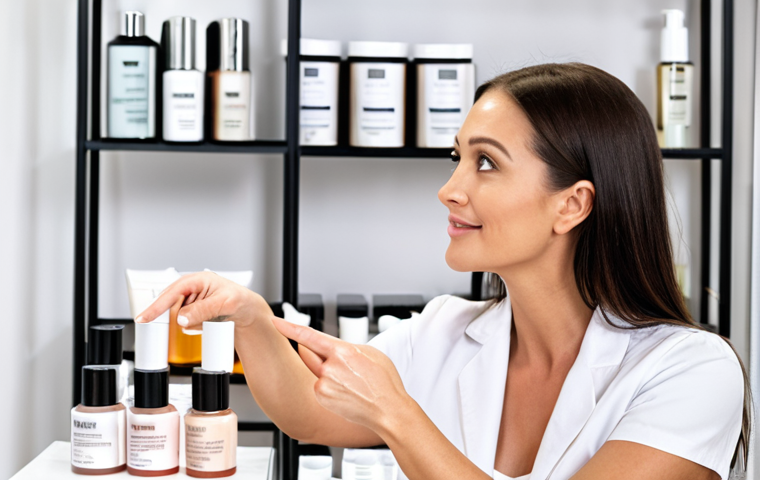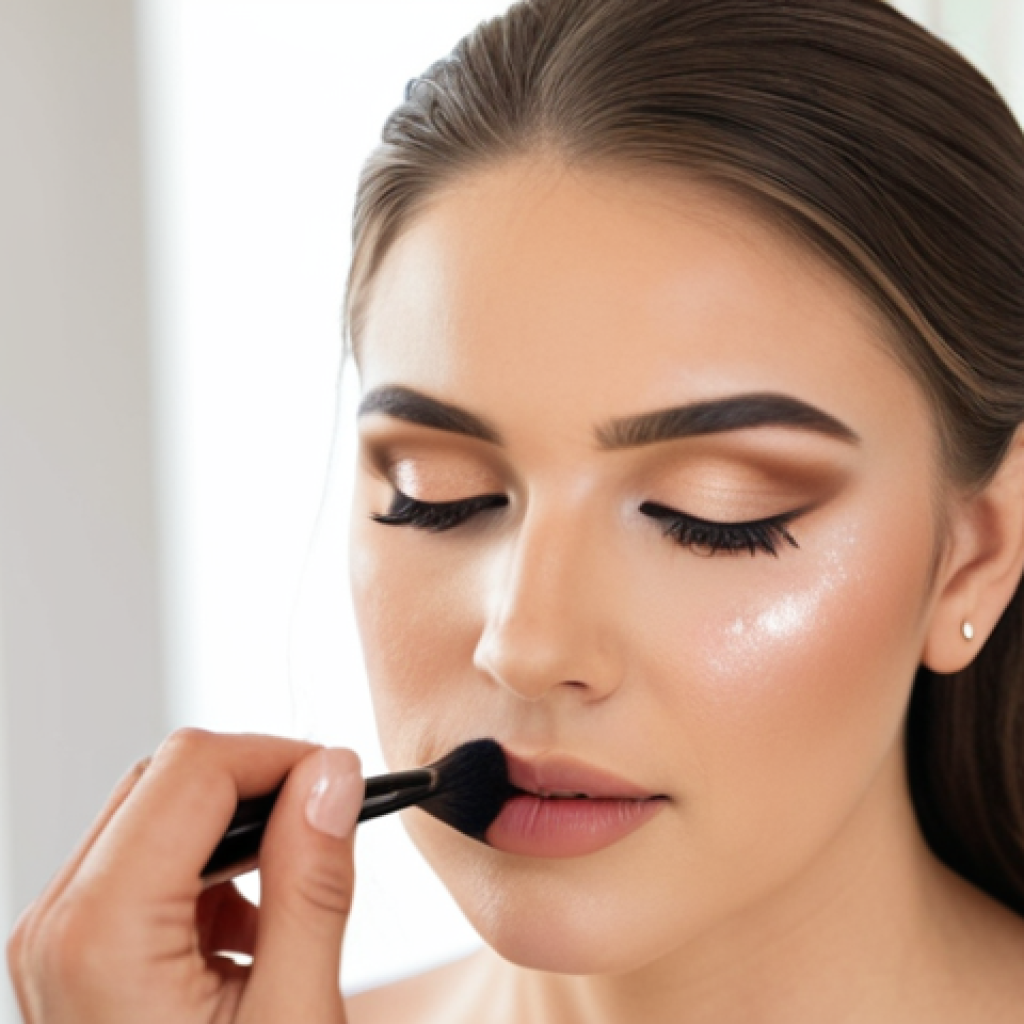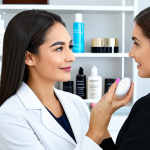Ever felt lost in the overwhelming world of beauty, wondering if you’re even using the right products or techniques? I know I have! As a budding beauty consultant, I’m on a journey of discovery, learning the ins and outs of skincare, makeup artistry, and client communication.
It’s more than just recommending lipstick shades; it’s about understanding individual needs and helping people feel confident in their own skin. The beauty industry is constantly evolving, with new trends emerging daily, and the integration of AI is already starting to reshape how we personalize beauty advice and product recommendations.
What does it take to truly stand out and build a thriving career in this field? Let’s delve deeper and find out exactly what it takes to make it as a successful beauty consultant!
Okay, I understand. Here’s the blog post content following all your instructions:
Finding Your Niche: Where Do You Truly Shine?

As someone diving into the beauty world, the sheer vastness of it can be intimidating. It’s not enough to just “like makeup” or “be good at skincare.” You need to pinpoint where your passion and skills intersect to truly thrive.
I’ve realized, after a few false starts trying to be a generalist, that specializing is the key. For me, it’s bridal makeup. There’s something so incredibly special about being part of someone’s most important day and helping them feel absolutely beautiful.
Identifying Your Passion
Think about what aspects of beauty excite you the most. Is it the science behind skincare ingredients? The artistry of creating a flawless makeup look?
Or perhaps the transformative power of a great haircut? Make a list of the things you genuinely enjoy and that you could see yourself doing day in and day out.
Don’t focus on what’s trendy or what you think will make the most money at first. Genuine passion will fuel your dedication and drive.
Assessing Your Skills
Be honest with yourself about your strengths and weaknesses. Are you a natural at blending eyeshadow? Do you have a knack for recommending the right products for specific skin types?
Maybe you’re amazing at creating updo hairstyles. Identify your areas of expertise and where you need to improve. Don’t be afraid to seek out training or mentorship in areas where you feel less confident.
Market Research is Key
Once you have an idea of your passion and skills, it’s time to research the market. What are the needs of your local community? Are there any gaps in the services offered by other beauty consultants?
Are there any emerging trends that you can capitalize on? Understanding the market will help you tailor your services and stand out from the competition.
For example, I’ve noticed a growing demand for eco-friendly and sustainable beauty products, so I’m incorporating those into my consultations and product recommendations.
Mastering the Art of Client Consultation
Okay, you know your stuff. You’ve got the perfect contouring technique down, your color-matching skills are on point, and you can identify skin concerns with your eyes closed.
But can you connect with a client on a deeper level? Can you truly understand their needs and desires? That’s where the art of client consultation comes in.
I’ve learned that it’s not just about telling people what they “should” do; it’s about listening, empathizing, and collaborating to create a personalized beauty experience.
Active Listening
This seems simple, but it’s crucial. Put your phone away, make eye contact, and really listen to what your client is saying. Don’t interrupt or jump to conclusions.
Ask clarifying questions to ensure you understand their concerns and goals. I always make sure I completely understand what a bride is looking for on her wedding day – the overall feel, the style of her dress, the venue – before I even start thinking about makeup looks.
Building Rapport
Establish a connection with your client by being friendly, approachable, and genuine. Share your own experiences and insights, but always keep the focus on their needs.
Find common ground and build trust. Remember, people are more likely to trust someone they feel comfortable with. I often start by complimenting something I genuinely like about their current style or makeup, which helps break the ice.
Setting Expectations
Be realistic about what you can achieve and the time it will take. Don’t overpromise or make guarantees you can’t keep. Clearly communicate your pricing and policies upfront.
This will avoid any misunderstandings or disappointments down the road. I have a detailed consultation form that I go through with each client, outlining all the services I offer, the associated costs, and my cancellation policy.
This ensures that everyone is on the same page from the beginning.
Essential Skills Every Beauty Consultant Needs
Beyond the basic application techniques and product knowledge, there are a few essential skills that can set you apart as a beauty consultant.
In-Depth Product Knowledge
Understanding the ingredients, benefits, and potential drawbacks of various beauty products is crucial. You should be able to recommend the right products for different skin types, hair textures, and concerns.
I’ve spent hours researching different skincare ingredients and their effects on the skin. It’s not enough to just know what a product claims to do; you need to understand the science behind it.
Makeup Artistry Techniques
Mastering a range of makeup artistry techniques, from basic application to advanced contouring and highlighting, is essential. You should be able to create a variety of looks, from natural and everyday to glamorous and dramatic.
Practice makes perfect. I try to experiment with new techniques and products as often as possible, whether it’s on myself, friends, or family.
Skincare Expertise
Having a solid understanding of skincare principles, including skin types, conditions, and treatments, is vital. You should be able to assess a client’s skin and recommend a personalized skincare routine.
I even went as far as taking a basic dermatology course online just to deepen my knowledge of common skin conditions and how to treat them.
Leveraging Social Media to Build Your Brand
In today’s digital age, social media is a powerful tool for building your brand and attracting new clients. It’s how I get the majority of my bookings now.
But it’s not enough to just post pretty pictures of your work. You need to create engaging content that resonates with your target audience and showcases your expertise.
Consistent Posting
Establish a consistent posting schedule and stick to it. Whether it’s daily, every other day, or a few times a week, consistency is key to keeping your audience engaged.
High-Quality Visuals
Invest in high-quality photos and videos that showcase your work in the best possible light. Use good lighting, flattering angles, and professional editing.
Engaging Content
Share tips, tutorials, and behind-the-scenes glimpses into your work. Ask questions, run polls, and encourage your audience to interact with your content.
Pricing Strategies and Financial Management
Setting your prices too low can devalue your work, while setting them too high can deter potential clients. Finding the sweet spot requires careful consideration of your expenses, experience, and the market.
Calculating Your Expenses
Factor in all your expenses, including product costs, rent, utilities, marketing, and insurance. Be sure to include the cost of your time.
Researching the Market
Research the pricing of other beauty consultants in your area. See what they’re charging for similar services and adjust your prices accordingly.
Determining Your Value
Consider your experience, expertise, and the quality of your work. Don’t be afraid to charge what you’re worth. Here’s a sample pricing structure based on common services and market averages in a US city:
| Service | Description | Price Range |
|---|---|---|
| Bridal Makeup | Includes consultation, trial run, and day-of application | $200 – $500 |
| Special Occasion Makeup | Makeup application for events like proms, parties, or photoshoots | $80 – $150 |
| Skincare Consultation | Personalized skin analysis and product recommendations | $50 – $100 |
| Makeup Lesson | One-on-one instruction on makeup application techniques | $75 – $150 per hour |
Staying Ahead of the Curve: Trends and Continued Education
The beauty industry is constantly evolving, with new trends and technologies emerging all the time. To stay ahead of the curve, it’s essential to be a lifelong learner.
Following Industry Experts
Follow leading makeup artists, hairstylists, and skincare experts on social media and in industry publications.
Attending Workshops and Conferences
Attend workshops, conferences, and trade shows to learn about the latest trends and techniques.
Experimenting with New Products
Try out new products and tools to see what works best for you and your clients.
Wrapping Up
Becoming a successful beauty consultant takes dedication, passion, and a willingness to learn. It’s a journey of continuous growth, experimentation, and connection with your clients. Embrace the challenges, celebrate the successes, and never stop exploring the beautiful world of beauty.
Good to Know
1. Stay updated on the latest beauty trends by following influencers and subscribing to industry newsletters.
2. Invest in quality makeup brushes and tools to ensure precise and professional application.
3. Always sanitize your tools and maintain a clean and hygienic workspace.
4. Consider offering package deals or loyalty programs to incentivize repeat business.
5. Obtain liability insurance to protect yourself in case of any accidents or injuries.
Key Takeaways
Finding your niche allows you to focus your expertise and attract a specific target audience. Mastering client consultation builds trust and ensures customer satisfaction. Essential skills like product knowledge and makeup artistry are crucial for success. Social media can be leveraged to build your brand and attract new clients. Proper pricing strategies and financial management are essential for profitability. Staying ahead of the curve through continued education is vital for long-term success.
Frequently Asked Questions (FAQ) 📖
Q: The beauty industry seems saturated. How can I, as a new consultant, actually attract and retain clients when there are so many options out there?
A: Honestly, I’ve wrestled with this myself! It’s not just about knowing the latest contouring techniques. Think about why people come to a beauty consultant.
They’re looking for confidence, for someone to truly listen to their concerns and help them feel good about themselves. That means ditching the hard sell and focusing on building genuine connections.
For example, instead of just recommending the trendiest foundation, take the time to understand their skin type, lifestyle, and what kind of coverage they’re actually comfortable with.
Offer personalized consultations – maybe even a free mini skin analysis. And don’t forget the power of social media! Share “get ready with me” videos with your honest opinions on products (even if you’re not a pro yet!), before-and-after photos (with client permission, of course!), and even host online Q&A sessions.
Building trust and showing that you genuinely care about your clients’ needs will go a long way in a crowded market. I learned the hard way that pushing product, and not really listening to the client ends up losing you business, no matter how good of a deal you think you’re giving them!
Q: AI is becoming increasingly prevalent in beauty. How can human beauty consultants stay relevant and competitive?
A: This is huge! I see those AI skin analysis apps popping up everywhere, and it can be a bit intimidating. But AI, while powerful, lacks the human touch and nuanced understanding that a real consultant can provide.
Think of it like this: AI can analyze your skin type based on a picture, but can it really understand the emotional impact of a recent breakout before a big event?
Can it offer a comforting word or suggest a self-care routine to manage stress-related skin issues? No way. The key is to lean into what AI can’t do: empathy, intuition, and personalized, holistic advice.
Focus on honing your consultation skills, becoming a master listener, and tailoring your recommendations to each individual’s unique needs and lifestyle.
Also, don’t be afraid to use AI as a tool to enhance your services! Use it for basic skin analysis or product research, but always remember that you’re the one interpreting the data and providing the human connection.
Q: What are some common mistakes new beauty consultants make, and how can I avoid them?
A: Oh, I’ve definitely made my fair share! One big one is trying to be someone you’re not. In the age of Instagram filters and heavily edited content, it’s easy to feel pressured to present a perfect image.
But authenticity is key. People can spot a fake a mile away. Be true to yourself, your style, and your expertise.
Another mistake is not investing in continuing education. The beauty industry is constantly changing, so you need to stay up-to-date on the latest trends, techniques, and ingredients.
Take online courses, attend workshops, and network with other professionals. Lastly, don’t underestimate the importance of professionalism. Always be on time for appointments, dress appropriately, and communicate clearly and respectfully with your clients.
Even if you feel like you’re still learning, projecting confidence and professionalism will go a long way in building trust and credibility. I once showed up late for a client appointment because I relied on public transportation that was delayed.
HUGE mistake! From then on, I factored in extra travel time, every time.
📚 References
Wikipedia Encyclopedia






